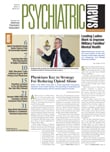Although menopause is infamous for triggering turbulent hormonal and mood swings, can it actually put women at risk for a major depression?
The answer has been murky based on the cross-sectional studies that have been conducted to answer this question. However, a new 10-year prospective study suggests that the answer is yes.
The study's lead investigator was Joyce Bromberger, Ph.D., an associate professor of epidemiology and psychiatry at the University of Pittsburgh, and findings were published online on February 9 in Psychological Medicine.
The study included 221 women aged 42 to 52 who were premenopausal at study entry. The Structured Clinical Interview for DSM-IV Axis I Disorders (SCID) was used to determine whether the subjects had ever experienced a major depression prior to the start of the study or whether they were experiencing a major depression at the time the study started. The SCID was also deployed during the subjects' annual follow-up assessments to determine whether they were experiencing a major depression.
Subjects were likewise evaluated annually to determine if they had experienced psychologically stressful events in the prior 12 months, and blood samples were taken annually to assay for reproductive hormone levels. If a subject was on hormone therapy at the time of an annual visit, data from that visit were not included in the study analyses.
Bromberger and her colleagues then examined whether subjects were significantly more likely to experience a major depressive disorder when they were perimenopausal or postmenopausal than when they were premenopausal. In evaluating this question, they considered possibly confounding factors such as a history of major depression, current psychologically stressful events, reproductive hormone levels, psychotropic medication use, body mass index, and hot flashes or night sweats.
It turned out that the risk of major depression was significantly greater not only during menopause, but within two years after the last menstrual period—that is, early postmenopause—than it was premenopausally.
"I was somewhat surprised that the risk for major depression in our sample was significantly higher during postmenopause than premenopause," Bromberger told Psychiatric News.
Why the menopause and postmenopause might increase women's risk of having a major depression, however, is not clear from this study. The researchers could find no significant associations between any reproductive hormone and major depressive episodes. Nonetheless, reproductive hormones could be the culprits, the researchers noted, since "single annual hormone samples have limited ability to provide information about the underlying hormonal dynamics that occur during the menopausal transition."
As for clinical implications of these findings, "it is important for health care providers to recognize that the risk for clinical depression, not just depressive symptoms, is greater during the menopausal transition and possibly early postmenopause," Bromberger said. "Women who present with depressive symptoms may benefit from close monitoring of mood and functioning and assessment of their situational and environmental circumstances. Such monitoring could lead to earlier interventions designed to interrupt the progression from depressive mood to major depression."
"This [was a] carefully done, long-term, prospective, cohort study," Deborah Cowley, M.D., a professor of psychiatry at the University of Washington, commented in the March 21 Journal Watch Psychiatry. "Clinicians should view the menopausal transition and early postmenopause as a high-risk time for major depressive episodes and consider antidepressants and/or psychotherapy, which remain the mainstay of treatment, given conflicting data about the benefit of hormonal inventions."
The study was funded by the National Institutes of Health and the Department of Health and Human Services.
